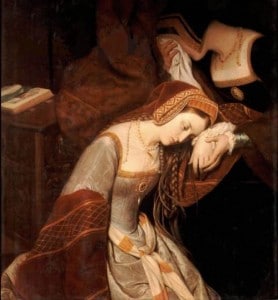 A letter with the heading “To the King from the Lady in the Tower” and allegedly written by Anne Boleyn, while she was imprisoned in the Tower, was said to have been found amongst Thomas Cromwell’s papers. It read:
A letter with the heading “To the King from the Lady in the Tower” and allegedly written by Anne Boleyn, while she was imprisoned in the Tower, was said to have been found amongst Thomas Cromwell’s papers. It read:
“Sir, your Grace’s displeasure, and my Imprisonment are Things so strange unto me, as what to Write, or what to Excuse, I am altogether ignorant; whereas you sent unto me (willing me to confess a Truth, and so obtain your Favour) by such a one, whom you know to be my ancient and professed Enemy; I no sooner received the Message by him, than I rightly conceived your Meaning; and if, as you say, confessing Truth indeed may procure my safety, I shall with all Willingness and Duty perform your Command.
But let not your Grace ever imagine that your poor Wife will ever be brought to acknowledge a Fault, where not so much as Thought thereof proceeded. And to speak a truth, never Prince had Wife more Loyal in all Duty, and in all true Affection, than you have found in Anne Boleyn, with which Name and Place could willingly have contented my self, as if God, and your Grace’s Pleasure had been so pleased. Neither did I at any time so far forge my self in my Exaltation, or received Queenship, but that I always looked for such an Alteration as now I find; for the ground of my preferment being on no surer Foundation than your Grace’s Fancy, the least Alteration, I knew, was fit and sufficient to draw that Fancy to some other subject.
You have chosen me, from a low Estate, to be your Queen and Companion, far beyond my Desert or Desire. If then you found me worthy of such Honour, Good your Grace, let not any light Fancy, or bad Counsel of mine Enemies, withdraw your Princely Favour from me; neither let that Stain, that unworthy Stain of a Disloyal Heart towards your good Grace, ever cast so foul a Blot on your most Dutiful Wife, and the Infant Princess your Daughter:
Try me, good King, but let me have a Lawful Trial, and let not my sworn Enemies sit as my Accusers and Judges; yes, let me receive an open Trial, for my Truth shall fear no open shame; then shall you see, either mine Innocency cleared, your Suspicion and Conscience satisfied, the Ignominy and Slander of the World stopped, or my Guilt openly declared. So that whatsoever God or you may determine of me, your Grace may be freed from an open Censure; and mine Offence being so lawfully proved, your Grace is at liberty, both before God and Man, not only to execute worthy Punishment on me as an unlawful Wife, but to follow your Affection already settled on that party, for whose sake I am now as I am, whose Name I could some good while since have pointed unto: Your Grace being not ignorant of my Suspicion therein.
But if you have already determined of me, and that not only my Death, but an Infamous Slander must bring you the enjoying of your desired Happiness; then I desire of God, that he will pardon your great Sin therein, and likewise mine Enemies, the Instruments thereof; that he will not call you to a strict Account for your unprincely and cruel usage of me, at his General Judgement-Seat, where both you and my self must shortly appear, and in whose Judgement, I doubt not, (whatsover the World may think of me) mine Innocence shall be openly known, and sufficiently cleared.
My last and only Request shall be, That my self may only bear the Burthen of your Grace’s Displeasure, and that it may not touch the Innocent Souls of those poor Gentlemen, who (as I understand) are likewise in strait Imprisonment for my sake. If ever I have found favour in your Sight; if ever the Name of Anne Boleyn hath been pleasing to your Ears, then let me obtain this Request; and I will so leave to trouble your Grace any further, with mine earnest Prayers to the Trinity to have your Grace in his good keeping, and to direct you in all your Actions.
Your most Loyal and ever Faithful Wife, Anne Bullen
From my doleful Prison the Tower, this 6th of May.”
You can read more about this letter in my article Anne Boleyn’s Letter to Henry VIII.
Notes and Sources
- The Life and Death of Anne Bullen, Queen Consort of England, printed by G. Smeeton, Charing Cross, Britain, 1820